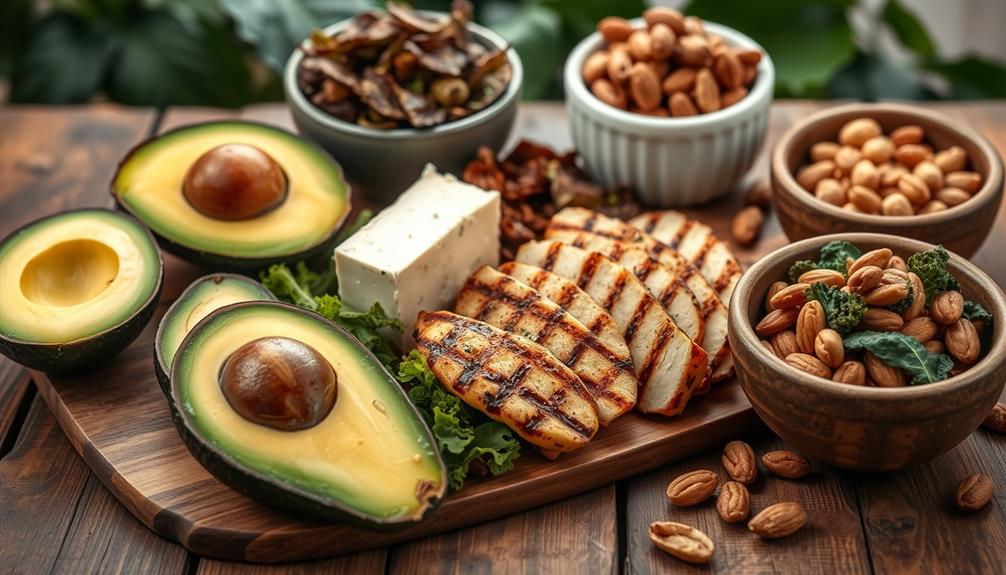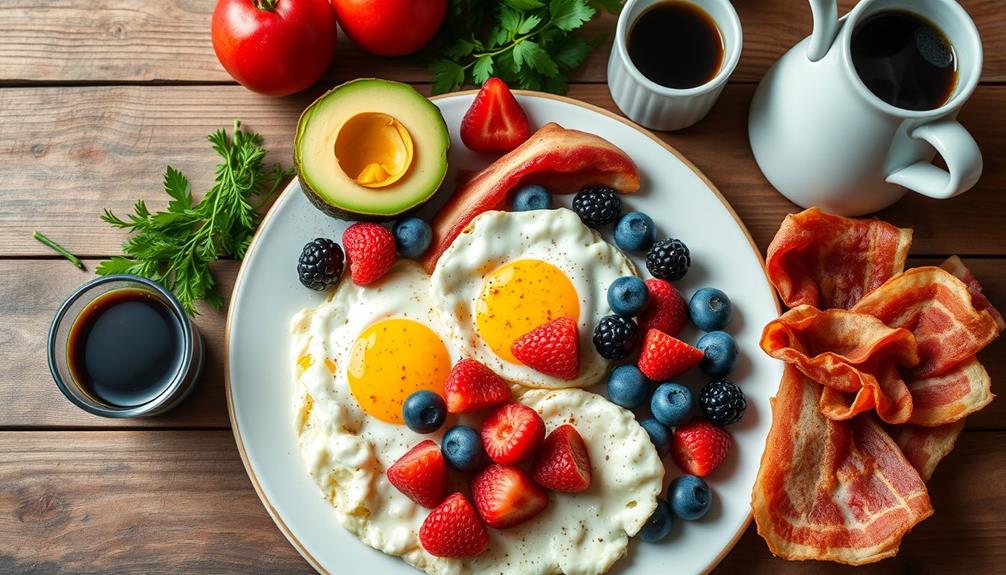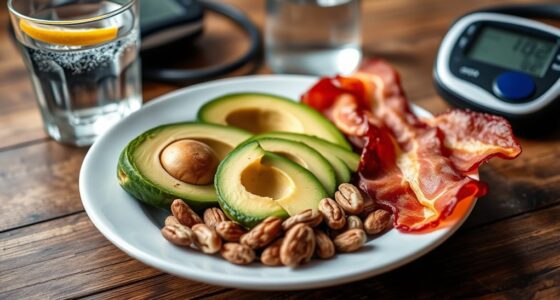To gain weight on a keto diet, focus on maintaining a caloric surplus of 200-500 calories daily. Increase your meal frequency to 3-6 meals, incorporating protein-rich foods like fatty fish, eggs, and full-fat dairy to support muscle growth. Aim for 1 gram of protein per pound of body weight and include healthy fats from avocados, nuts, and cooking oils to boost calories. Engage in resistance training 2-3 times a week for ideal muscle gain. With some strategic choices, you'll find it easier to reach your weight gain goals while staying in ketosis. There's much more to explore on this journey!
Key Takeaways
- Maintain a caloric surplus of 200-500 calories daily to support weight gain on a keto diet.
- Increase meal frequency to 3-6 meals daily for maximizing caloric intake.
- Aim for 1 gram of protein per pound of body weight to promote muscle growth.
- Incorporate healthy fats like avocados, nut butters, and fatty fish to boost calorie intake.
- Engage in strength training 2-3 times a week to enhance muscle gain while on keto.
Understanding Weight Gain Motivations

Understanding your motivations for weight gain is essential when commencing on a keto diet. Many individuals seek weight gain to enhance their physique, aiming to add muscle mass and boost their overall size and strength. This pursuit often stems from a desire to improve sports performance or simply cultivate a healthier body image.
If you're underweight, defined as having a BMI of less than 18.5, you might feel motivated to achieve healthy weight gain due to the associated health risks, including increased mortality rates and frailty. Additionally, it's important to recognize that proper nutrition plays a key role in this process; focusing on nutrient-dense foods can help you achieve your goals effectively.
Moreover, you may be combatting age-related muscle loss, especially if you're an older adult wanting to maintain functional strength and independence. It's essential to reflect on self-confidence, as improving your body image can greatly impact your mental wellbeing.
Remember, your caloric and protein intake plays an important role in achieving your goals. Opt for nutrient-dense foods that support a healthy lifestyle while providing the necessary energy for muscle growth.
Whether you're aiming to stay within a normal BMI range or looking to target specific health outcomes, recognizing your motivations will guide your keto journey effectively.
Effective Strategies for Healthy Weight Gain

Gaining weight on a keto diet can be achieved with the right strategies in place. Start by ensuring you're in a caloric surplus of 200-300 calories daily. Focus on low-carb, high-calorie foods like fatty meats and avocados, which help avoid excess carbohydrate intake.
Incorporating foods rich in antioxidants, such as avocados, can enhance overall health while adhering to your diet antioxidants in food. Aim for at least 1 gram of protein per pound of body weight to support muscle gain. Nutrient-dense sources such as eggs, poultry, and fatty fish are excellent choices.
Increasing your meal frequency to 3-6 meals a day gives you more opportunities to stack high-calorie, nutrient-dense foods. Incorporate snacks like nuts, cheese, and cream-based dishes to boost your calorie intake.
Don't forget to engage in resistance training at least 2-3 times a week. Prioritize compound exercises, as they help build lean muscle mass, effectively increasing your overall weight.
Nutrient-Dense Foods to Include

To successfully gain weight on a keto diet, you'll want to focus on high-quality protein sources and healthy fats. Incorporating foods like fatty fish, avocados, and full-fat dairy can greatly boost your caloric intake while providing essential nutrients.
Additionally, including low-carb vegetables can enhance your meals with fiber and vitamins, promoting overall health. By choosing the right nutrient-dense options, you'll support your weight gain goals effectively.
For more information on optimizing health with a keto diet, consider exploring various recipes that adhere to these principles.
High-Quality Protein Sources
When you're looking to gain weight on a keto diet, incorporating high-quality protein sources is essential. These proteins not only help you reach your weight gain goals but also support your overall health.
Fatty fish like salmon and mackerel are excellent choices; they're calorie-dense and provide essential omega-3 fatty acids, making them ideal for your keto plan. Additionally, you might find that essential oils, such as eucalyptus oil, can support overall wellness during your dietary journey.
Eggs are another versatile option, offering around 7 grams of protein and 80 calories per large egg, along with choline, which aids in muscle function.
Lean meats, particularly fatty cuts such as beef ribeye and pork belly, deliver high-quality protein while contributing healthy fats necessary for ketosis.
Don't overlook full-fat dairy options like Greek yogurt and high-fat cheese. These foods supply protein, calcium, and beneficial fats that support muscle building.
Additionally, incorporating whey protein supplements can effectively boost your protein intake, especially when paired with resistance training, promoting muscle growth and recovery.
Healthy Fats Options
Incorporating healthy fats into your keto diet is crucial for achieving weight gain while maintaining nutritional balance. Focus on nutrient-dense foods that increase your caloric intake without compromising your macronutrient goals. For instance, understanding common financial terms can help you allocate your budget wisely when purchasing these foods.
Start with fatty fish like salmon and mackerel, which are rich in omega-3 fatty acids. These not only provide healthy fats but also deliver essential nutrients important for weight gain.
Avocados are another excellent choice, offering around 15 grams of fat per fruit, enabling you to add calories without raising carbohydrate levels considerably.
Don't forget about full-fat dairy products. Items like cheese and Greek yogurt are high in calories and fat, with cheddar cheese containing about 9 grams of fat and 7 grams of protein per ounce.
Nut butters, such as almond or macadamia, are also calorie-dense; just two tablespoons of almond butter pack about 18 grams of fat and 7 grams of protein.
Lastly, utilize healthy cooking oils like olive oil, coconut oil, and avocado oil to boost your meals. One tablespoon of olive oil alone adds approximately 120 calories and 14 grams of fat, making it a simple way to enhance your keto foods for weight gain.
Building Muscle on a Keto Diet

Building muscle on a keto diet is entirely achievable with the right approach. To gain muscle effectively, aim for around 1 gram of protein per pound of your body weight. This guarantees you have enough amino acids available for muscle repair and synthesis.
You'll also want to maintain a caloric surplus of 200-500 calories daily, focusing on high-fat and protein-dense foods. These healthy fats not only support your ketogenic diet but also promote muscle growth. Additionally, understanding the importance of key domains of development can enhance your approach by recognizing how physical activity contributes to overall well-being.
Incorporate regular strength training sessions into your routine, ideally 2-3 times per week. Focus on compound exercises like squats, deadlifts, and bench presses, which engage multiple muscle groups and enhance overall strength. This progressive overload is essential for increasing lean muscle mass and improving your body composition.
Don't forget hydration and electrolyte balance. Aim for 5,000-7,000 mg of sodium, 500 mg of magnesium, and 3,500-4,700 mg of potassium daily. These are crucial for peak muscle function and recovery on a ketogenic diet.
With dedication and the right strategies, you can successfully build muscle while enjoying the benefits of keto.
Quick Tips for Weight Gain

To gain weight on a keto diet, you'll want to increase your caloric intake by focusing on healthy fats and nutrient-dense foods.
Incorporating coffee into your routine can be beneficial, as various brewing methods allow for a variety of ways to enjoy high-fat beverages like bulletproof coffee.
Additionally, incorporate regular strength training to build muscle mass, which is key for healthy weight gain.
Increase Caloric Intake
How can you effectively increase your caloric intake on a keto diet? To reach your weight gain goals, aim for an additional 200-500 calories per day. Focus on high-calorie, low-carb foods like fatty meats, avocados, and full-fat dairy. These choices provide the necessary energy without pushing you over your carbohydrate limits.
It's also important to take into account incorporating proper diet guidelines that emphasize healthy fats and protein sources.
Incorporate nutrient-dense snacks into your routine—think nuts, cheese, or olive oil-based dips—between meals. These will help you boost overall caloric consumption without making you feel overly full.
Additionally, gradually increase your portion sizes at each meal. Make sure that your meals are satisfying and packed with healthy fats and protein to support muscle growth.
It's also vital to monitor your daily caloric intake. Using food tracking apps can help you stay consistent with your weight gain targets while adhering to the ketogenic macronutrient ratio.
Focus on Healthy Fats
Focusing on healthy fats is a key strategy for increasing your caloric intake while on a keto diet. By incorporating nutrient-dense fats, you can effectively support weight gain without exceeding your carbohydrate limits. Aim for around 60% of your daily caloric intake to come from healthy fats.
Here's a quick reference table to help you choose the right sources of healthy fats:
| Healthy Fats | Benefits |
|---|---|
| Avocados | High in fiber and potassium |
| Coconut Oil | Contains medium-chain triglycerides (MCTs) for energy |
| Fatty Cuts of Meat | Delivers essential nutrients and calories |
| High-Fat Dairy | Provides calcium and protein for muscle growth |
| Nuts and Seeds | Packed with calories and healthy fats |
Incorporating these foods into your meals will not only enhance flavor but also contribute necessary calories for weight gain. Choose fatty cuts of meat like ribeye or pork belly and indulge in full-fat cheese and Greek yogurt. Snacking on nuts and seeds will keep you satisfied while adhering to your low-carb diet. Prioritize these healthy fats to guarantee you're fueling your body effectively.
Regular Strength Training
Regular strength training is essential for anyone looking to gain weight on a keto diet. By engaging in regular strength training at least 2-3 times per week, you'll boost your chances of building muscle and increasing your body composition. This process aligns with the principles of creative problem-solving that emphasize the importance of structured approaches, just as you'd structure your training regimen.
Focus on compound exercises like squats, deadlifts, and bench presses, which work multiple muscle groups simultaneously and promote muscle growth.
To effectively stimulate hypertrophy, aim for progressive overload by gradually increasing the weight or resistance during your training sessions. Mix intense sessions of about 1 hour with lighter 30-minute sessions to balance muscle fatigue and recovery.
Remember, to support your training, you need to consume more calories, including healthy fats and adequate protein per day.
As you progress, monitor your body composition and adjust your caloric intake based on your weight gain goals. Don't forget to incorporate healthy snacks to help you meet your daily calorie requirements.
Finally, verify you're meeting your electrolyte needs during your keto adaptation phase to prevent cramping and support muscle function.
With dedication to regular strength training, you'll see significant gains in no time!
Sample Keto Meal Plan

Creating a sample keto meal plan for gaining weight involves incorporating high-calorie, low-carb foods that will help you meet your nutritional goals.
Start your day with scrambled eggs cooked in butter, adding spinach and cheese for a nutrient-dense breakfast packed with healthy fats and protein. Additionally, it's essential to understand tax implications of your dietary choices, as managing your finances effectively can support your keto journey.
For lunch, whip up a satisfying salad featuring mixed greens, grilled chicken, avocado, and a generous drizzle of olive oil. This meal not only keeps your carb intake low but also boosts your caloric intake with those important healthy fats.
Dinner could consist of baked salmon paired with roasted non-starchy vegetables like broccoli or zucchini, ensuring you get a balance of protein and necessary nutrients to support your weight gain journey.
Don't forget to snack throughout the day! Options like nuts, cheese, or Greek yogurt can serve as healthy snacks that effectively increase your caloric intake while keeping you in ketosis.
Aim for a macronutrient ratio of approximately 60% fat, 30% protein, and 10% carbs to maximize your weight gain on the keto diet. Following this meal plan will set you on the path to reaching your goals.
Frequently Asked Questions
Is It Harder to Gain Weight on Keto?
Yes, it can be harder to gain weight on keto. The low carb intake often reduces your appetite, so you'll need to consciously increase your calorie intake with high-fat, nutrient-dense foods to see results.
Can a Skinny Person Gain Weight on Keto?
Absolutely, you can gain weight on keto! By consuming calorie-dense, low-carb foods, and incorporating strength training, you'll transform your body. Focus on high-fat options, and watch those pounds soar while maintaining ketosis effortlessly!
How Do I Increase My Fat on Keto?
To increase your fat intake on keto, focus on high-quality fats like avocados, olive oil, and fatty meats. Incorporate full-fat dairy, cook with butter, and enjoy fatty fish to boost your overall caloric intake.
How to Stop Losing Weight on Keto?
Imagine a garden; without nourishment, flowers wilt. To stop losing weight on keto, nourish your body with calorie-rich foods, eat frequent meals, and strengthen your roots through resistance training and quality rest. Keep thriving!
Conclusion
In your journey to a healthier weight on a keto diet, remember it's all about balance and nourishment. Embrace those nutrient-packed foods and don't shy away from adding a little extra to your plate. Think of it as giving your body a warm hug of energy and strength. With the right strategies and a sprinkle of creativity in your meals, you'll find that gaining weight can be just as delightful as shedding it. Enjoy the process!









